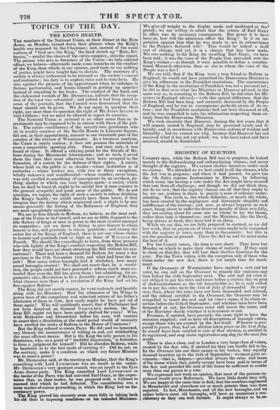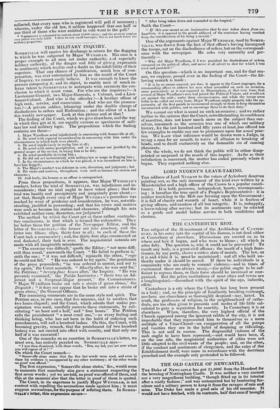REGISTRY OF ELECTORS.
COBBETT says, while the Reform Bill was in progress, he looked merely to the disfranchising and enfranchising clauses, and never thought of the registry. We cannot shelter ourselves under such an excuse. We attended as we best could to all the clauses, while the Act was in progress; and when it had passed, we gave (on the 7th July) copious Instructions to Electors, by following which every one having a vote under the Act might have secured that vote from all challenge; and though we did not think then, nor do we now, that the registry clauses are all that they ought to be, we see nothing in them to puzzle a man of ordinary under- standing. The truth is, the whole difficulty, or nearly the whole, has been created by the negligence and downright stupidity and indifference of the electors ; and now, as always happens in such cases, being about to suffer the deserved penalty of their own folly-, they are casting about for some one on whom to lay the blame, rather than bear it themselves ; and the Ministers, like the Devil, being always at hand, they have laid it on them.
While we say this, we are fully prepared to contend, as we did last week, that no payments of taxes or rates ought to be connected with the registry in town, more than in the country: but this is not the question at present. There the Act is, and we must make the best of it.
For the County voters, the time is now short. They have but Monday on which to make their claims of registry. If they omit to claim on that day, they will lose their elective franchise for the year. For the Town voters, with the exception only of those who claim under the new Act, there is yet ample time for enrol- ment.
If the Overseers of Westminster have omitted a scot and lot voter, he can call on the Overseer to remedy the omission any time before the '25th September next. The scot and lot voter is not obliged to pay his rates and taxes before a certain day on pain of disfranchisement, as the 10/. householder is; he is only called on to pay his rates up to the 31st of July if demanded. In every case, then, where the rates have not been demanded and refused, and the refusal certified to the Overseer, the Overseer may be compelled to insert the scot and lot voter's name, if he claim in- sertion before the 25th of September; and whether rates have been demanded or not, the Overseer must still insert the name, and et the Barrister decide whether it is to remain or not.
Freemen, if omitted, have precisely the same right to have the omission supplied ; and so have all descriptions of borough voters, except those who are created by the Act itself. Whoever is pre- pared to prove, that, had an election taken place on the 31st July; he would have been entitled to vote at that election, is entitled to be registered, and may claim registration any day for the next five weeks.
There is also a class, and in London a very large class of voters, created by the Act, who, if omitted (as they can hardly fail to be, for the Overseer has not their names in his books), may equally demand insertion up to the 25th of September: we mean joint oc- cupants,—that is lodgers,—provided always the rates and. taxes of the house which they jointly occupy have been paid in terms of the Act, and provided the rent of the house be sufficient to entitle more than one person to a vote. We expressed last week an opinion, that most of the persons re- gistered would prove Reformers. We have little doubt they will. We are happy at the same time to find, that the numbers registered in Manchester and elsewhere are so much greater than was then reported. In fact, Manchester, and all the new boroughs, and we rather believe most old boroughs, will have as numerous a con- stituency as they can well furnish. It ought always te be re, collected, that every man who is registered will poll if necessary ; whereas, under the old law, it seldom happened that one half or one third of those who were entitled to vote went to the poll.*
* Westminster is calculated to contain about 18.000 voters; awl the greatest number ever polled was only 5,339. Unless in very small boroughs, this is not much below the ordinary proportion.



























 Previous page
Previous page